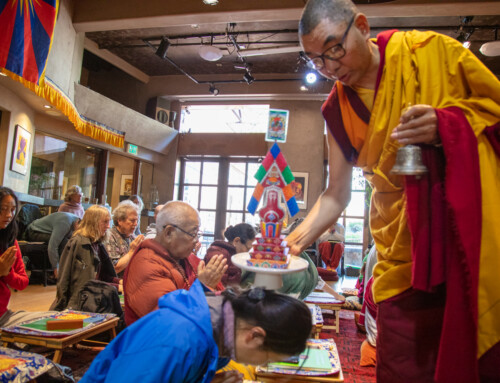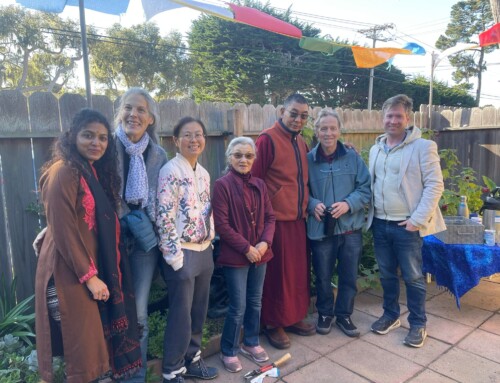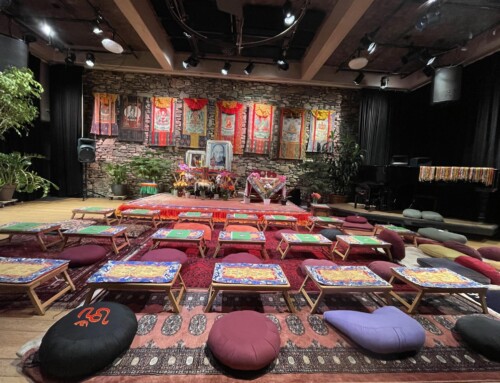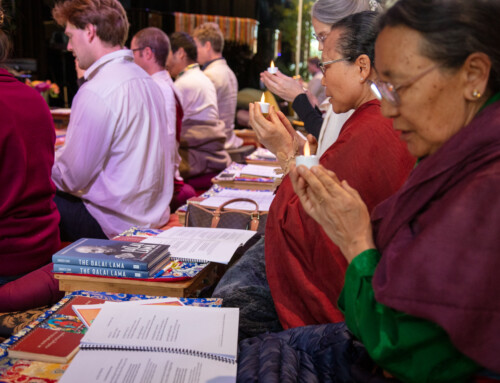The 5 Precepts (Pancasila)
- “I undertake to abstain from killing sentient beings.”
- “I undertake to abstain from stealing and taking what is not given.”
- “I undertake to abstain from sexual misconduct.”
- “I undertake to abstain from false and divisive speech.”
- “I undertake to abstain from alcoholic drinks, drugs, and other intoxicants.”
Benefits and Precepts of Refuge
[This is a brief explanation of the benefits and precepts of Refuge given by Rinpoche to a student]
I also see that subject as a most important one, as I mentioned before at the end of talking about the Guru.
I have some acquaintances and disciples who say, ‘You look like Yidam Vajrakilaya. Please give us Vajrakilaya initiation! Others want teachings on the Six Yogas of Naropa. Some want teachings on Tantra, Tzogchen and so forth. Rather than grabbing for teachings with big-sounding names, no one is talking about the preliminaries that are common to all Dharma practice, which are the teachings that really benefit your being. Many previous masters and adepts have said that the preliminaries are more profound than the main body of a practice!
Refuge is like the foundation of Buddhism. If a building doesn’t have a strong stable foundation, no matter how many stories are constructed on top of it, it will all be unstable. If the foundation is well constructed the upper stories will not move. Similarly, if you don’t have the foundation of Refuge in your mind, whatever profound practices you try to request and practice, it will really be fruitless. Therefore, refuge is very important and I will explain what I know about it.
Once we are wandering in the three realms of samsara, the reality of the situation is that we are not self-sufficient ourselves, and we must seek refuge with another. There are many who seek refuge in those famed in the world as the Sun and Moon, Brahma and Vishnu, regional Deities and earth Lords. In regard to the refuge of those of us who call ourselves Buddhists, followers of the kind founder Buddha, it is as said in Sutra,
Buddha, Dharma and Sangha Is the Refuge of those seeking liberation.
Thus it is said. The refuge is in Buddha who reveals the actual Refuge, the holy Dharma, the path he accomplished, and those companions who assist us in accomplishing Refuge, the Sangha. These are known to all as the Three Rare Supreme Refuges or Three Jewels of Refuge. It is Refuge that determines whether we are Buddhist or not. Our Tibetan Buddhadharma, teachings that are especially exalted among present day tenet systems in being Unexcelled Tantra complemented by all the Four Tantra Sets, adds the root Guru along with the Three Jewels of Refuge. We recite,
NAMO GURUBHYE
NAMO BUDDHAYA
NAMO DHARMAYA
NAMO SANGHAYA
If you wonder, ‘Can’t powerful worldly gods protect me?’ they can protect you temporarily from bad conditions and obstacles in this life, but they can’t ultimately protect you from the suffering of samsara and lower realms of existence. As said in the Sutra of the Sacred Victory Banner,
Frightened by danger, beings go for refuge:
Many in mountains or forests,
In pleasure gardens or in special trees,
As well as in altars.
These are not the main Refuges.
Although you rely on such refuges,
You will not be freed from great suffering.
The last line means that they can’t protect you from the sufferings of the three realms. If you wonder, ‘Well then, what about lamas and monks of the present who are called Sangha?. How can they protect me if they are not beyond the three realms’ sufferings? Or since they cannot provide such protection, should they not be included among the objects of Refuge?’ In general, in regards to Sangha, there are both principal and ordinary Sangha members. The principal ones who are like the crescent moon, actual Bodhisattvas, this includes those like the eight great heart-son Bodhisattvas, actual Sangha, pure Sangha who have already attained the fruit of their path. The term Bikshu and Sangha is also used these days to refer to lamas and monks who are ordinary monks who have entered the path. They are also called ‘merely imputed Sangha’. In brief, the state of the Sangha Refuge Jewel includes those attainments explained in Uttaratantra, the eight Dharma qualities of knowledge and liberation. Present day lamas and monks are also suitable to view as objects of Refuge for, just as someone who must pass through a very dangerous region must go with an accompanying force of courageous warriors they really trust, in order to attain the unexcelled Buddha Jewel in dependence upon the path of the Dharma Jewel, we definitely need the Sangha Jewel also as our companions and facilitators for accomplishing the path. That is why the Sangha Jewel is also suitable to perceive as our Refuge. So no matter how bad a lama or monk might be, without the slightest realization or training, if we offer them something, respect them and make prayers, it will give rise to positive energy and potential, it is meritorious, whereas if we speak badly of them, deny them and so forth, it is certain to give rise to some negatively ripening karmic effect. Therefore, at best, cultivate respect and veneration for even a piece of the orange robe. But even if that level of respect is not possible, it is still very negative to denigrate or make light of a Bikshu. As said in Sutra,
Statues, verses of scripture,
And patched yellow cloth,
View as Buddha with faith and admiration!
All that is taught by Buddha
Revere at your crown and do not discount!
All beings, pure and impure,
Are to be viewed as holy and sacred.
Thus it is said. So what is the cause for the Refuge we are talking about? It is faith and aspiration. If one has no faith one cannot generate Refuge in ones mind or understand the qualities of the Jewels of Refuge. Sutra says,
For people who have no faith,
Positive Dharma will not arise
Just as a seed burnt by fire
Will not grow into a green sprout.
That example clearly illustrates the meaning. From among the three types of faith, it is the stable faith of conviction that is the faith with which we go for refuge. Lord Buddha said,
Out of all positive Dharmas, what gives the most unexcelled results? It is this: pure faith!
Thus he spoke. Guru Rinpoche also said,
For those with faith, male or female,
Padmasambhava never dies; he is there.
Thus, the Lords of the Teachings of Sutra and Tantra praised refuge highly, and kindly taught it to their disciples. All of the previous great holy scholar-adepts also went for refuge with faith and conviction knowing the reasoning behind it, keeping that as their ‘yidam’, their main meditation, and it was invariably on the basis of that foundation that they trained themselves in the uncommon paths and attained enlightenment. Some think that the word ‘yidam’ must refer to a frightening Deity with faces and arms and it is probably very rare to find anyone who considers the Three Jewels, our ultimate Refuge, as their ‘Yidam’. Jowo Je Glorious Atisha, a pandit who was like the moon, ‘king among all the constellations’ of scholars and adepts of India and Tibet, also said,
There is no teaching of Sutra and Tantra I do not know!
I’ve seen no teaching that surpasses that of Refuge!
When he came to Tibet Atisha would recite Refuge prayers and never teach anything but Refuge. One day one of his disciples said to him, ‘If you, a great pandit, only give prayers of Refuge, they are saying that in the future you will be called the ‘Refuge Lama!’ Atisha replied, ‘Then just that name by itself will serve Buddha’s Teachings!’
My kind Lama, a true yogi, a present day great bearer of the Teachings, Kyabje Sangye Tenzin Rinpoche, said,
O meditators!, The Three Precious Jewels
Which never fail to protect you,
Are forever the Refuge for those wanting freedom;
So persevere in Refuge throughout the six periods of day and night!
He didn’t merely say this; most of the time the only prayer that he ever said was that of Refuge, and he would do anything he could to encourage others to practice Refuge. Even if people requested Mo’s or divinations, he would just tell them to engage in virtuous practices such as a hundred thousand Refuge prayers. Often when giving teachings and in the course of conversation he would say things like, ‘If you trust in the Three Jewels from the depths of your heart, there is no danger from which you won’t be protected!’ When even those great beings, bearers of the Teachings, gave the appearance of knowing no other teaching than Refuge, it is doubtful that they made it their main practice out of frustration as a last resort! It seems that they made it their main practice because they considered Refuge to be the very essence of the teachings of Sutra and Tantra!
These days when you talk about saying Refuge prayers, some people think it’s an instruction for old people who don’t know anything, something very easy; this is definitely a mistake. At best you should clearly make Refuge itself your principal meditation for attainment of the unexcelled Buddha Jewel, the Form and Truth Bodies endowed with the two purposes and eight qualities of realization, through practicing in reliance upon the Dharma Jewel, the true paths that develop in your mind. At least make it your principal practice until you receive a perfect path-sign quality of the Three Jewels in your mind. Signs that you have entrusted yourself to the Three Jewels are that you feel strong conviction in the natural karmic law of cause and effect and that you experience a relaxation and smoothing of your conduct of body, speech, and mind, like the smooth relaxed strides of a turtle. The early Kadampa scholar-siddhas also said that when Refuge is truly integrated in your mind, your hair stands on end when the words, ‘Three Jewels of Refuge’ are uttered, and when you think of the qualities of the Three Jewels it causes tears to come to your eyes. Otherwise, having an uneven mind that fluctuates between clarity and turbulence, highs and lows, and conduct that is always on the verge of cruelty or ostentatiousness, these are because of Refuge not integrating into your mind, it is said.
As regards precepts of refuge, there are things to abandon, things to accomplish, and precepts with equal parts of both. As for that to be abandoned, having gone for refuge in Buddha, don’t view worldly Deities or Earth Lords, such as Thirthika Gods, as your refuge. Having gone for refuge in Dharma, don’t cause harm to sentient beings directly or indirectly. Having gone for refuge in Sangha, do not be companions with Thirthikas or those with degenerated samaya or mistaken views. That is briefly the advice about what to abandon. Regarding what is to be accomplished, having gone for refuge in Buddha, respect and venerate images of Buddha whether they are painted on cloth, modeled in clay or whatever medium is used. Having gone for refuge in Dharma, view scriptures and Dharma books as the actual Dharma Jewel, and show them respect and veneration. Having gone for refuge in Sangha, venerate the Sangha and monks, viewing them as the actual Sangha Jewel, not walking in their way, disrespecting them, and so forth. As for precepts with equal parts of each, do not abandon the Three Jewels because of others’ disdain or because they want you to! And no matter what great sickness or suffering befalls you, not putting your ultimate hopes in other things such as the treatment, services, divinations, harm-averting rituals, and so forth, put your ultimate hopes in the Three Jewels. Always persevere in pleasing the Three Jewels and offer the first portion of whatever you eat or drink to the Three Jewels. For example, when traveling, visualize the Objects of Refuge and Field of Merit over to your right side and imagine that you are circumambulating them and so forth. When sleeping, meditate on the Merit Field at your heart and contemplate it dissolving into the clear light of sleep. When eating and drinking visualize it at your throat and offer the first portion of food and drink, completing the two accumulations. When sitting down visualize it at your crown, making prayers and requests and receiving the four initiations.
In brief, the benefits of going for Refuge with faith and conviction in the Three Jewels are inconceivable. To briefly summarize them, you enter the Buddhist order; it serves as a foundation for all of the vows; it completes a huge accumulation of merit; it purifies delusions, negative karma and obscuration; you become invulnerable to harm of humans and non-humans; you don’t take unfortunate rebirth such as in lower realms of existence; your wishes are accomplished in this life; and you will swiftly attain Buddhahood. Infinite benefits are taught. If you would like more extensive teachings on this you can read the short commentary on Refuge that I wrote last year called Staircase for Those Taking the Path to Liberation, which has been translated into English. (editors note–will add link to this longer text once identified)
There are five things to guard against for someone taking lay vows of refuge brahmacharya, or pure conduct.
These are:
- killing,
- stealing,
- sexual misconduct,
- lying,
- and drinking of alcohol.
Committing to abandon these five is called the ordained lay vows. To give a brief explanation of this, as for 1. killing, it refers primarily to killing human beings but, as a branch, means not wanting to intentionally kill anything, even down to insects. With regard to 2. stealing, this means stealing things that belong to others, either without being seen or through deception or cheating, stealing others’ wealth. As for 3. sexual misconduct, this means sleeping with a husband or wife other than ones own. 4. Lying means saying that you have high spiritual attainments that you don’t have. Although you don’t have that much Dharma knowledge, deceiving others by pretending that you do through physical or mental acts or verbal lies that contradict the reality. 5. As for drinking alcohol, if you overindulge in current-day intoxicating substances of fermented drinks, drunk with alcohol, you will gradually get used to bad behavior that wastes the rest of your life, and also greatly harms your health. It is also unsuitable to overindulge in other types of intoxicating substances which are eaten or sniffed, etc.
These guidelines must definitely be followed because keeping such discipline is really what safeguards your wellbeing and ever increasing happiness. Good ethics are like a friend who protects you in this life and helps you to attain not only fortunate rebirth in human or divine states, but ultimately the state of full enlightenment of Buddhahood, like a staircase to happiness. We should understand that it is only for the benefit of the person who practices it, not for someone who is making rules. The benevolent Buddha set forth these guidelines to care for and protect those who seek Liberation, as a path to happiness; they are not for the sake of his own profit! It is like a mother instructing her cherished child about what to do and what to avoid, all of her guidance being for the happiness of her child’s life, not for the sake of herself.
In short, ethical discipline is a way that relies on being careful and conscientious. If we are a careless person, our actions of body, speech, and mind worsen, and bad behavior will cause us to encounter many difficulties. If we are someone who is continuously conscientious, we will turn away from harmful actions of body, speech, and mind and go towards positive ways of being. Becoming someone who is noble and morally upstanding, our life, not only in this lifetime, but in future lifetimes, as well, will become more and more blissful. All of this depends on a cause, which is our actions of body, speech, and mind in this life. Whether our actions become better or worse depends upon whether we are conscientious or not. We must understand that this depends upon whether of not we can practice protecting ourselves from these negative actions previously explained. These lay precepts are not only relevant to Buddhist refuge vows; even in normal worldly affairs, if you kill, steal, commit adultery, etc, transgressing these Buddhist ethics, you could be sentenced to death or imprisonment.
Understanding that it is important to keep these precepts in both Dharma and life in the world, we should regard them, not as a burden, but joyfully, as an ornament, and keep them correctly. Generally speaking, these five precepts to guard against killing and so forth, are not just things to avoid. If we actively engage in practices that oppose them we can turn from five negative actions to five positive ones. For example, not just avoiding killing but engaging in its opposite by practicing saving lives of sentient beings. Abandoning stealing, we can practice giving to others. Abandoning impure sexual behavior we can encourage others to do the same. Abandoning lying, we can always speak the truth. Abandoning drinking alcohol ourselves, we can help others to give up drinking. In this way, negative paths will naturally become positive ones, like poison transforming into medicine.
There are three types of lay vows, the complete lay vows, the single lay vows, and the multiple lay vows. Complete lay vows means taking all five of the precepts. Single lay vows means keeping one of the five precepts your whole life. Multiple lay vows refers to taking some other number of the vows. This is how it is taught in the Vinaya, the Scriptures on Discipline, but in this context, if you can take all the precepts, it would be very powerfully auspicious and beneficial.
Written by Khenpo Karten Rinpoche (help and translation yet to be ascribed), presented to students on January 8th, 2025 at the Manjushri Dharma Center, on the auspicious occasion of the Refuge Ceremony.






